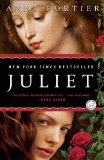Book Club Discussion Questions
In a book club? Subscribe to our Book Club Newsletter!
For supplemental discussion material see our Beyond the Book article, The Appeal of Doomed Lovers and our BookBrowse Review of Juliet.
Please be aware that this discussion guide will contain spoilers!
Reading Group Questions and Discussion Topics for Juliet:
- In Anne Fortier's novel Juliet, Shakespeare's Romeo and Juliet casts a long shadow over the lives of the main characters, past and present. Looking at the "original" story of Romeo and Giulietta set in 1340, consider in what ways Fortier uses Shakespeare's great tragedy as a model for her own work, and in what ways she departs from it.
- Discuss the ways in which the bonds of sisterhood—for good and for ill—are central to the novel. Why do you think Fortier introduces this element into her story?
- Although there are surprising revelations about all the characters in the novel, perhaps the most shocking has to do with Umberto, Aunt Rose's faithful butler. Did you find Umberto to be a sympathetic character? Why or why not?
- Very early in the novel, we are introduced to Julie's recurring dream—a dream that seems to foretell her own fate and to recapitulate the fate of Romeo and Guilietta centuries earlier. Is there a rational explanation for this dream, or is it a supernatural occurrence? And what about the other seemingly supernatural events or objects in the novel, such as the divine intervention of the Virgin Mary on Giulietta's wedding night with Messer Salimbeni, or the destructive powers of Romeo's signet ring; can these events be explained rationally?
- How does the relationship of Janice and Julie evolve over the course of the novel? What are the major turning points? Did you find these changes believable? Why or why not?
- Why does Friar Lorenzo champion the young lovers, risking his life on their behalf? Do you think he is justified in placing a curse on both the Tolomei and the Salimbeni houses?
- Juliet is in many ways a novel about families and the secrets and obligations that hold them together . . . and sometimes force them apart. Consider the bonds of family, love and duty in the three families we meet in the 1340 storyline, beginning with the relationship between fathers and their children. In what ways are they different? How are they the same? And what about the present-day narrative ... has anything changed?
- Maestro Lippi occupies the studio of Maestro Ambrogio, and, like Ambrogio, he, too, has a dog named Dante. Is the author trying to suggest that Lippi is some kind of reincarnation of Ambrogio? What is the relationship between these two characters, separated by centuries?
- What about Julie and Alessandro: are they reincarnations of Giulietta and Romeo, forced to repeat the actions of their ancestors by the terms of an ancient curse, or by some genetic inheritance? In what ways do the lives of the two sets of characters parallel or echo each other? In what ways are they different?
- Compare the ways that the characters from 1340 think and act to the ways the present-day characters think and act. Are they more or less impulsive? More or less rational? Does love mean the same thing to them? How, for example, is the love that develops between Julie and Alessandro different from that of Romeo and Giulietta? What accounts for these differences?
- Compare the banter between Romeo and Giulietta at their first meetings with the corresponding text of Shakespeare's Romeo and Juliet, especially in Act I, Scene V, and Act II, Scene II. Note where Fortier follows Shakespeare and where she goes her own way. Why do you think she makes those choices? How do those choices distinguish her versions of Romeo and Juliet from their more famous antecedents?
- At one point, Alessandro tells Julie: "In my opinion, your story—and Romeo and Juliet as well—is not about love. It's about politics . . . ." Do you agree or disagree with this statement? Why? What do you think the author's opinion is?
- Themes of guilt, redemption, and second chances course through the novel, especially in the present-day narrative, impelling many of the characters and their actions. Consider which characters embrace the opportunity of a second chance, and which don't.
- Another prevalent theme is that of twins and twinning. Not only are some characters born as twins, but others seem to be mirrored across the centuries. At one point in the novel, Julie sits on the front steps of the Siena Cathedral, thinking about the myth behind the black-and-white Siena coat-of-arms, the Balzana, which involves a pair of twins fleeing from their evil uncle on a black and a white horse. Why do you think Fortier has woven these threads - twinning and black-and-white - so strongly into her fictional tapestry?
- Why does Alessandro keep his true identity a secret from Julie for so long? Is he right to do so?
- Does Julie trust Alessandro too easily? Why does she wait so long to confront him with what she knows about his actions and his identity?
- At the end of the novel, Julie muses: "Who knows, maybe there never was a curse. Maybe it was just us—all of us—thinking that we deserved one." Do you think there was a curse, or not?
- Flash forward five years past the end of the novel. What has happened to Julie and Janice? What about Umberto? If there was going to be a sequel to this novel, told from Janice's point of view, what questions would you like to have answered, and what themes would you like so see further explored?
Unless otherwise stated, this discussion guide is reprinted with the permission of Ballantine Books.
Any page references refer to a USA edition of the book, usually the trade paperback version, and may vary in other editions.
